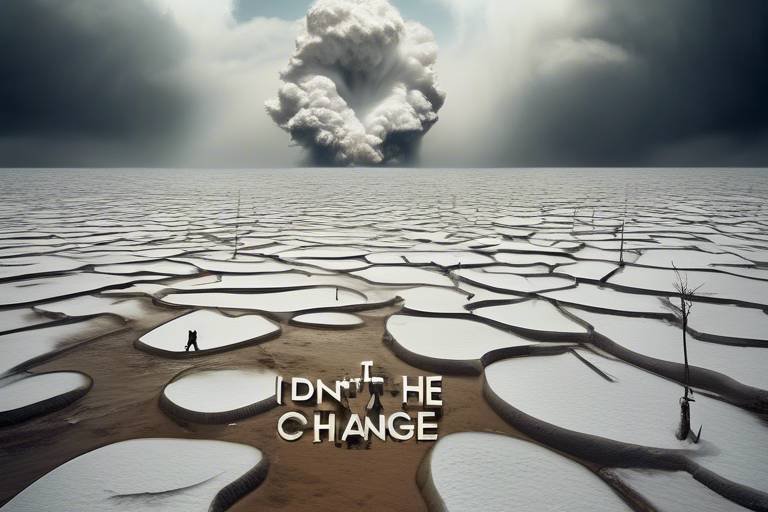The Role of Philosophy in Environmental Protections
In today's world, where the effects of climate change and environmental degradation are more visible than ever, the question arises: what role does philosophy play in shaping our approach to environmental protection? This exploration is not just academic; it affects real-world policies and practices that aim to safeguard our planet. Philosophy provides us with the frameworks to understand our moral obligations towards nature and future generations. It pushes us to consider not only what we can extract from our environment but also what we owe to it.
At its core, environmental philosophy challenges us to rethink our relationship with the natural world. Are we merely its masters, or are we part of a larger ecosystem that deserves respect and care? This inquiry leads to a deeper appreciation of the interconnectedness of all life forms. By examining our ethical responsibilities, we can cultivate a more sustainable way of living that honors both human needs and the health of the planet.
Furthermore, philosophical discussions often highlight the importance of ethical frameworks in environmental decision-making. These frameworks can guide policymakers, businesses, and individuals in making choices that reflect a commitment to sustainability. For example, integrating concepts from ecocentrism—which values all living beings and ecosystems—into legislation can lead to more holistic environmental policies. Conversely, an anthropocentric perspective, which prioritizes human interests, can result in short-sighted decisions that harm the environment.
As we delve deeper into the implications of these philosophical stances, it becomes clear that they can either facilitate or hinder our efforts to protect the environment. This article will explore various philosophical frameworks, their impacts on environmental ethics, and the ways in which they can inform effective policies. By engaging with these ideas, we can better understand the moral imperatives that drive environmental protection and the importance of fostering a sustainable future for all.
- What is environmental philosophy?
Environmental philosophy is a branch of philosophy that examines the moral relationship between humans and the environment, exploring ethical principles that guide our interactions with nature. - How does philosophy influence environmental policies?
Philosophy provides ethical frameworks that inform decision-making processes, helping policymakers consider the broader impacts of their actions on ecosystems and future generations. - What are anthropocentrism and ecocentrism?
Anthropocentrism is a viewpoint that places humans at the center of moral consideration, while ecocentrism values all living beings and ecosystems equally, advocating for a more holistic approach to environmental ethics. - Why is it important to consider future generations in environmental ethics?
Considering future generations ensures that current actions do not compromise the ability of those who come after us to meet their own needs, promoting sustainability and justice.

Philosophical Foundations of Environmental Ethics
When we dive into the world of environmental ethics, it’s like peeling back the layers of an onion—each layer revealing a deeper understanding of our relationship with nature. At its core, environmental ethics is about asking the big questions: What is our moral obligation to the planet? How do our actions today affect the future? These questions are not merely academic; they shape the very policies and practices that govern how we interact with the environment.
To grasp the philosophical foundations of environmental ethics, we must first understand several key theories that inform our moral obligations towards nature and future generations. One of the most influential frameworks is utilitarianism, which suggests that the best action is the one that maximizes overall happiness. In the context of environmental ethics, this means considering the well-being of not just humans but all sentient beings. This perspective encourages us to evaluate the consequences of our actions on the ecosystem as a whole.
Another significant philosophical approach is deontology, which emphasizes duty and rules over consequences. Here, the focus shifts to our obligations towards nature itself. For instance, if we believe that nature has intrinsic value, we may argue that it deserves protection regardless of the benefits it provides to humans. This perspective is crucial in shaping policies that prioritize conservation and respect for all forms of life.
Furthermore, the concept of virtue ethics plays a role in environmental ethics by highlighting the importance of character and moral virtues in our relationship with the environment. A virtuous individual, in this view, would practice sustainability, showing respect and care for the natural world. This personal responsibility can lead to broader societal changes as individuals advocate for policies that reflect these virtues.
In addition to these frameworks, the idea of intergenerational justice is pivotal. It raises the question: What responsibilities do we have to future generations? This principle compels us to think beyond our immediate needs and consider the long-term impacts of our actions on the planet. For example, if we deplete natural resources today, we are essentially robbing future generations of their right to a healthy environment.
These philosophical foundations serve as a compass, guiding our understanding of environmental ethics and influencing the policies we create. They remind us that our relationship with the environment is not merely transactional but deeply ethical. By embracing these principles, we can foster a more sustainable and equitable relationship with our planet.

Anthropocentrism vs. Ecocentrism
The debate between anthropocentrism and ecocentrism is central to our understanding of environmental ethics and the policies that stem from these philosophical perspectives. At its core, anthropocentrism places humans at the center of moral consideration, asserting that nature is primarily a resource for human use. This view is deeply entrenched in many societies, where economic growth and human welfare often take precedence over ecological health. For instance, when we think about land development, the anthropocentric mindset might prioritize building new homes or businesses, often overlooking the impact on local ecosystems and wildlife.
On the other hand, ecocentrism challenges this notion by advocating for a more holistic approach that values all living beings and ecosystems. It argues that every component of the natural world, from the tiniest microbe to majestic forests, has intrinsic value and deserves consideration in our decision-making processes. This perspective encourages a shift from seeing nature merely as a backdrop for human activity to recognizing it as a complex web of life that supports our existence. Imagine a bustling city where every tree is cut down to make way for new buildings; ecocentrism would argue that these trees are not just obstacles but vital players in our ecosystem, providing oxygen, supporting wildlife, and contributing to our mental well-being.
These contrasting views significantly shape environmental protection strategies. For example, anthropocentric policies might focus on resource extraction, often leading to practices like deforestation, mining, and pollution, justified by the promise of economic growth. In contrast, ecocentric policies would advocate for sustainable practices that prioritize conservation and the health of ecosystems. A classic example of this is the debate over renewable energy sources. While anthropocentrism might push for rapid development of solar farms without considering their impact on local habitats, ecocentrism would promote a more measured approach, ensuring that these projects are designed to coexist with the natural environment.
Moreover, the implications of these philosophies extend beyond environmental policies; they influence our cultural narratives and societal values. For instance, an anthropocentric worldview may foster a sense of entitlement over nature, leading to exploitation and degradation. In contrast, an ecocentric perspective encourages stewardship and responsibility, promoting practices that honor the interconnectedness of all life forms. This shift in perspective is not merely academic; it has real-world implications for how we tackle pressing issues like climate change, biodiversity loss, and resource scarcity.
In conclusion, the dichotomy between anthropocentrism and ecocentrism is not just a philosophical debate; it is a crucial factor in determining the future of our planet. By understanding these perspectives, we can better navigate the complex landscape of environmental ethics and work towards solutions that respect both human needs and the health of our ecosystems. As we move forward, embracing an ecocentric approach may be our best chance at fostering a sustainable future where both humanity and nature can thrive.

Implications of Anthropocentrism
When we talk about anthropocentrism, we're diving into a worldview that places humans at the center of the universe, often at the expense of the natural world. This perspective has profound implications for how we interact with our environment. Imagine treating the Earth like a vast buffet, where everything is available for our consumption without considering the long-term consequences. This mindset can lead to the exploitation of natural resources, resulting in significant environmental degradation. For instance, forests are cleared for agriculture and urban development, often disregarding the ecosystems that depend on these habitats.
The consequences of such an anthropocentric approach are not just limited to environmental degradation; they also extend to social justice issues. When policies prioritize human interests without considering the broader ecological impacts, marginalized communities often bear the brunt of these decisions. For example, industrial pollution may be concentrated in low-income neighborhoods, leading to health disparities. This raises an important question: Are we truly valuing human life if we allow some lives to be sacrificed for the benefit of a few?
Furthermore, anthropocentrism can foster a sense of entitlement among humans, leading to a disconnect from the natural world. We may begin to see nature as merely a resource to be exploited rather than a complex web of life that deserves respect and protection. This mindset can also influence our policies and practices, often resulting in short-sighted decisions that prioritize immediate gains over long-term sustainability.
To illustrate the implications of anthropocentrism, consider the following table that outlines some key areas affected by this perspective:
| Area | Implication |
|---|---|
| Resource Management | Overexploitation leading to depletion of resources |
| Environmental Policy | Short-term gains prioritized over sustainability |
| Social Justice | Marginalized communities disproportionately affected |
| Public Health | Increased pollution and health disparities |
The need for a paradigm shift is clear. By recognizing the limitations and consequences of anthropocentrism, we can start to explore alternative frameworks that promote a more inclusive and respectful relationship with the environment. This is where ecocentrism comes into play, offering a holistic approach that values all living beings and ecosystems.
In conclusion, the implications of anthropocentrism are far-reaching, affecting not only our environment but also our social structures and ethical considerations. As we navigate the complexities of environmental protection, it is crucial to acknowledge these implications and strive for a more balanced perspective that honors both humanity and the planet we inhabit.
- What is anthropocentrism?
Anthropocentrism is a worldview that places humans at the center of importance, often leading to the exploitation of natural resources without regard for ecological balance.
- How does anthropocentrism affect environmental policies?
It often results in short-sighted policies that prioritize human interests over sustainable practices, leading to environmental degradation.
- What are the consequences of an anthropocentric approach?
Consequences include resource depletion, pollution, social injustice, and a disconnect from the natural world.
- What is ecocentrism?
Ecocentrism is an ethical perspective that values all living beings and ecosystems, promoting a more sustainable and respectful relationship with nature.

Case Studies of Anthropocentric Policies
When we talk about anthropocentric policies, we're diving into a realm where human interests take precedence over the natural world. This perspective often leads to decisions that prioritize short-term gains for humanity at the expense of the environment. Let's explore some notable case studies that illustrate the implications of such policies.
One striking example is the deforestation of the Amazon Rainforest. Driven by agricultural expansion and logging, policies have favored economic development over ecological preservation. The Brazilian government has historically implemented policies that encourage land clearing for cattle ranching and soy production, which, while boosting the economy, have resulted in devastating impacts on biodiversity and climate stability. In fact, according to a report by the World Wildlife Fund, approximately 17% of the Amazon has been lost in the last 50 years, showcasing the dire consequences of prioritizing human economic interests.
Another case that highlights the pitfalls of anthropocentrism is the overfishing crisis in global oceans. Many countries have adopted fishing policies that focus on maximizing catch limits without adequately considering the long-term health of fish populations. For example, the United States has seen significant declines in fish stocks like cod and haddock due to policies that allowed overfishing. This not only threatens the fish species but also the livelihoods of communities that depend on fishing, illustrating a classic case of short-sightedness where immediate human needs overshadow ecological balance.
In urban environments, the construction of highways and infrastructure often exemplifies anthropocentric thinking. Cities expand with little regard for the natural habitats that are destroyed in the process. Take, for instance, the construction of the Interstate Highway System in the United States. While it facilitated economic growth and mobility for humans, it also fragmented ecosystems, leading to habitat loss for countless species. The result? A long-term ecological imbalance that affects not just wildlife but also urban air quality and human health.
Finally, we can look at energy policies that favor fossil fuels over renewable resources. Many nations continue to invest heavily in oil and coal, driven by immediate economic benefits, despite the clear evidence of climate change. For example, the U.S. withdrawal from the Paris Agreement under a previous administration was a significant move that reflected anthropocentric values, prioritizing short-term economic interests over global environmental responsibilities. This decision has had profound implications on international climate efforts, showcasing how anthropocentrism can hinder progress towards sustainability.
In summary, these case studies serve as cautionary tales of what happens when human interests dominate policy-making without considering the broader ecological implications. The consequences of anthropocentric policies are often severe, leading to environmental degradation and long-term risks not just for nature, but for humanity itself. It is a clear call for a shift in perspective towards more ecocentric approaches that recognize the intrinsic value of all living beings and the ecosystems they inhabit.

Critiques of Anthropocentrism
Anthropocentrism, the belief that human beings are the central or most significant entities in the world, has been a dominant perspective in shaping environmental policies. However, this viewpoint has faced significant critiques from various philosophical angles. Critics argue that prioritizing human interests often leads to a disregard for the intrinsic value of non-human entities and ecosystems. They contend that such a narrow focus can result in devastating consequences for the environment and future generations.
One major critique is that anthropocentrism fosters a sense of entitlement among humans, allowing for the exploitation of natural resources without considering the long-term impacts on the planet. This entitlement can manifest in various ways, such as deforestation, pollution, and the extinction of species. The argument here is not just about the ethical implications of harming the environment; it's about recognizing that all living beings have a right to exist, regardless of their utility to humans. In this sense, a more inclusive ethical framework is necessary, one that acknowledges the rights of non-human entities and emphasizes the interconnectedness of all life forms.
Philosophers like Arne Naess, who introduced the concept of Deep Ecology, advocate for a biocentric approach, which values all living beings equally. This perspective challenges anthropocentrism by suggesting that nature should not only be viewed as a resource for human use but as a complex web of life that deserves respect and protection. Naess argues that our moral obligations extend beyond our species, urging us to consider the well-being of all organisms and ecosystems.
Moreover, the critique of anthropocentrism extends into the realm of social justice. Environmental degradation disproportionately affects marginalized communities, often those who contribute the least to environmental harm. By prioritizing human interests, particularly those of the affluent, anthropocentrism can perpetuate inequalities and hinder efforts toward sustainable development. This intersection of environmental ethics and social justice highlights the need for a more equitable approach that considers the rights and needs of both humans and non-humans alike.
In summary, the critiques of anthropocentrism emphasize the necessity for a paradigm shift in our ethical considerations. By moving towards an ecocentric perspective, we can foster a deeper respect for the natural world and promote policies that reflect a commitment to sustainability and justice. This shift not only benefits the environment but also enhances the quality of life for all beings, ensuring that we create a more harmonious existence on our planet.
- What is anthropocentrism? Anthropocentrism is the belief that human beings are the most important entities in the universe, often leading to the prioritization of human needs over ecological concerns.
- Why is anthropocentrism criticized? It is criticized because it can lead to environmental degradation and a lack of consideration for the rights and well-being of non-human entities.
- What is ecocentrism? Ecocentrism is a philosophical perspective that values all living beings and ecosystems, advocating for a more holistic approach to environmental ethics.
- How can we shift from anthropocentrism to ecocentrism? By adopting policies that recognize the intrinsic value of nature, promoting sustainable practices, and integrating ethical considerations into decision-making processes.

Benefits of Ecocentrism
Embracing ecocentrism can be a transformative experience, not just for our environment but for our entire way of life. Imagine a world where the health of our planet is as paramount as our own personal interests. This perspective encourages a profound respect for all living beings and ecosystems, fostering a more harmonious relationship between humanity and nature. One of the most significant benefits of ecocentrism is its holistic approach; it recognizes that everything is interconnected. When we prioritize the well-being of ecosystems, we inadvertently support our own survival and prosperity.
Ecocentrism shifts our focus from a narrow human-centric view to a broader understanding of life on Earth. This shift leads to numerous advantages:
- Enhanced Biodiversity: By valuing all forms of life, ecocentrism promotes conservation efforts that protect diverse species and their habitats. Biodiversity is essential for ecosystem resilience, ensuring that natural systems can withstand changes and continue to provide essential services.
- Sustainable Resource Management: An ecocentric approach encourages the responsible use of natural resources, ensuring that they are used in a way that does not compromise the ability of future generations to meet their needs. This sustainable mindset can lead to innovative practices in agriculture, forestry, and fishing.
- Improved Ecosystem Services: Healthy ecosystems provide vital services such as clean air, water purification, and climate regulation. By prioritizing ecological health, we enhance these services, which are crucial for human survival.
Furthermore, ecocentrism fosters a deeper sense of responsibility. When we view ourselves as part of a larger ecological community, we are more likely to engage in practices that protect our environment. This perspective can inspire grassroots movements, encouraging communities to come together to advocate for sustainable policies and practices.
Consider the impact of ecocentrism on climate change. By acknowledging the intrinsic value of nature, we can develop strategies that not only mitigate climate change but also adapt to its effects. This might include restoring natural habitats that sequester carbon or implementing policies that limit emissions based on ecological thresholds rather than just economic ones.
In essence, the benefits of ecocentrism extend far beyond environmental protection; they touch every aspect of our lives. By adopting this perspective, we can create a future where both humanity and the planet thrive together, leading to a more just and sustainable world.
Q: What is ecocentrism?
A: Ecocentrism is an ethical perspective that places intrinsic value on all living beings and ecosystems, emphasizing the interconnectedness of life and the importance of preserving ecological balance.
Q: How does ecocentrism differ from anthropocentrism?
A: While anthropocentrism prioritizes human interests and welfare, ecocentrism values the health of the entire ecosystem, recognizing that human well-being is intrinsically linked to the health of the planet.
Q: Can ecocentrism influence policy making?
A: Yes, ecocentrism can shape environmental policies by promoting laws and regulations that protect ecosystems and biodiversity, ensuring that decision-making processes consider the rights and needs of all living beings.
Q: What are some practical applications of ecocentrism?
A: Practical applications include sustainable agriculture, conservation efforts, renewable energy initiatives, and community-driven environmental projects that prioritize ecological health.

Philosophy and Climate Change
When we think about climate change, it’s easy to get lost in the numbers—rising temperatures, melting ice caps, and increasing carbon emissions. But what if I told you that at the heart of these pressing issues lies a rich tapestry of philosophical inquiry? Philosophy isn't just an abstract discipline; it profoundly shapes our understanding of climate change and our ethical responsibilities towards it. The questions we ask and the values we hold can either propel us towards action or leave us stagnant in the face of crisis.
One of the most compelling philosophical discussions surrounding climate change is the concept of ethical responsibility to future generations. Imagine a world where our actions today could either pave the way for a thriving planet or lead to dire consequences for those yet to be born. This moral obligation is not just a nice idea; it’s a call to action that resonates deeply in the hearts of many. We must ask ourselves: What legacy do we want to leave behind? The choices we make now will echo through time, shaping the world our children and grandchildren will inherit.
Moreover, the interconnectedness of global issues plays a crucial role in understanding climate change. Philosophically, it's vital to recognize that climate change isn't an isolated problem; it’s intertwined with social justice, economic disparity, and environmental degradation. By adopting a holistic view, we can see how our actions in one area affect another, leading us to more comprehensive and collaborative solutions. For instance, addressing poverty can enhance resilience to climate impacts, while sustainable practices can alleviate environmental burdens.
To illustrate this interconnectedness, consider the following table that summarizes key areas where climate change intersects with other global issues:
| Global Issue | Impact of Climate Change |
|---|---|
| Food Security | Increased droughts and floods disrupt food production, leading to shortages. |
| Health | Climate change exacerbates health issues, such as respiratory diseases and heat-related illnesses. |
| Economic Stability | Extreme weather events can devastate economies, particularly in vulnerable regions. |
| Social Justice | Marginalized communities often bear the brunt of climate impacts, highlighting inequalities. |
As we navigate these complex issues, philosophy provides a framework to guide our decision-making. It encourages us to reflect on our values and consider the broader implications of our actions. Are we prioritizing short-term gains over long-term sustainability? Are we taking into account the voices of those who will be most affected by our choices? These are the kinds of questions that philosophical inquiry can help us address.
In essence, philosophy serves as a compass, guiding us through the murky waters of climate change. It challenges us to think critically about our responsibilities and the ethical implications of our actions. As we stand at this crossroads, let’s embrace the philosophical discourse surrounding climate change, not just as an academic exercise, but as a vital part of our collective journey towards a sustainable future.
- How does philosophy contribute to our understanding of climate change? Philosophy helps us explore ethical responsibilities and the interconnectedness of global issues, guiding our actions toward sustainability.
- What is the ethical responsibility to future generations? It refers to our obligation to ensure that our actions today do not compromise the ability of future generations to meet their own needs.
- Why is interconnectedness important in addressing climate change? Recognizing the links between climate change and other global issues allows for more comprehensive solutions that consider multiple facets of sustainability.

Ethical Responsibilities to Future Generations
When we think about the future, it can feel a bit like gazing into a foggy crystal ball. We know that our actions today will ripple through time, impacting those who come after us. This raises an important question: what are our ethical responsibilities to future generations? As stewards of the planet, we have a duty to ensure that the world we leave behind is not just a barren wasteland but a thriving ecosystem filled with opportunities and resources.
At the heart of this ethical dilemma lies the principle of sustainability. This concept urges us to consider the long-term effects of our choices, promoting a balance between our current needs and the well-being of future inhabitants of Earth. Imagine if you were entrusted with a beautiful garden. You would want to cultivate it, ensuring that it flourishes not only for your enjoyment but also for those who will come after you. In a similar way, our planet is a shared garden that requires careful tending.
One of the key aspects of our responsibilities is to preserve natural resources. We must recognize that resources like clean water, air, and biodiversity are finite. If we exploit them recklessly, future generations may find themselves in a world where these essentials are scarce. For instance, the depletion of fossil fuels not only affects our energy consumption today but also threatens the energy security of tomorrow. By embracing renewable energy sources, we can provide a sustainable path forward, ensuring that future generations have access to the energy they need.
Moreover, we must also consider the ethical implications of climate change. The actions we take—or fail to take—today can significantly influence the climate that future generations will inherit. It's a bit like playing a game of dominoes; one small push can lead to a cascade of effects. By reducing our carbon footprint and advocating for policies that combat climate change, we are not just protecting our own interests but actively safeguarding the future of the planet.
It's essential to engage in dialogues about our responsibilities to future generations. This can be achieved through education and community involvement. By fostering a culture of sustainability, we can inspire others to think critically about their choices. Imagine a world where every individual understands their role in environmental stewardship—where people are motivated to make decisions that prioritize the health of the planet. This collective effort can create a powerful movement towards a more sustainable future.
In conclusion, our ethical responsibilities to future generations are profound and far-reaching. It’s not merely about leaving behind a legacy; it’s about ensuring that the world we pass on is one that is vibrant, healthy, and full of potential. As we navigate the complexities of modern living, let’s remember that our actions today are the seeds of tomorrow's reality. By embracing sustainability, preserving resources, and engaging in meaningful conversations, we can fulfill our obligations to those who will inherit this planet after us.
- What are our ethical responsibilities to future generations?
We have a duty to ensure a sustainable and thriving planet by preserving natural resources and combating climate change. - How can we preserve natural resources?
By embracing renewable energy, reducing waste, and promoting conservation efforts. - Why is climate change an ethical issue?
Our actions today affect the climate and resources available to future generations, making it a moral obligation to act responsibly. - How can education help in fulfilling our responsibilities?
Education fosters awareness and inspires individuals to make sustainable choices, creating a culture of environmental stewardship.

Interconnectedness of Global Issues
When we think about environmental challenges, it's easy to focus on one issue at a time, like climate change, pollution, or deforestation. However, the reality is much more complex. These issues are not isolated; they are intricately woven together in a web of interconnectedness that spans across various sectors and disciplines. For instance, consider how climate change affects food security. Rising temperatures and unpredictable weather patterns can lead to crop failures, which in turn can cause food shortages and increased prices. This scenario illustrates how environmental degradation can ripple through economies and societies, affecting everything from health to social stability.
Moreover, the extends beyond environmental concerns. Think about how poverty and inequality can exacerbate environmental problems. Communities that lack resources often resort to unsustainable practices simply to survive. They might overfish, deforest, or pollute their surroundings, not out of malice, but out of necessity. Thus, addressing environmental issues requires a holistic approach that considers economic, social, and political factors.
Philosophically speaking, this interconnectedness challenges us to rethink our ethical responsibilities. If we accept that our actions have far-reaching consequences, we must also acknowledge our duty to act not just for ourselves, but for the global community and future generations. This is where the concept of global citizenship comes into play. It encourages individuals and nations to see beyond their immediate interests and recognize their role in the larger ecosystem of life on Earth.
To further illustrate this point, let’s take a look at some key areas where interconnectedness plays a crucial role:
- Climate Change and Health: Air pollution from fossil fuels not only contributes to climate change but also poses serious health risks, leading to increased healthcare costs and reduced quality of life.
- Deforestation and Biodiversity Loss: The destruction of forests not only contributes to climate change but also threatens countless species, disrupting ecosystems and diminishing biodiversity.
- Water Scarcity and Conflict: As freshwater resources become scarcer due to climate change and pollution, competition for these resources can lead to conflicts, further destabilizing regions.
In summary, recognizing the interconnectedness of global issues is not just an academic exercise; it has practical implications for how we approach environmental protection. By understanding that our challenges are intertwined, we can develop more comprehensive and effective solutions. This means fostering collaboration across borders, disciplines, and sectors, and integrating ethical considerations into every decision we make. Only then can we hope to create a sustainable future that honors our responsibilities to both our planet and each other.
Q1: Why is it important to understand the interconnectedness of global issues?
A1: Understanding the interconnectedness of global issues helps us see the bigger picture and realize that solutions require a holistic approach. It enables us to address root causes rather than just symptoms.
Q2: How can individuals contribute to addressing interconnected global issues?
A2: Individuals can contribute by making informed choices, advocating for policies that promote sustainability, and supporting organizations that work on multiple fronts to tackle these issues.
Q3: What role do governments play in addressing interconnected global issues?
A3: Governments play a crucial role in creating policies that recognize the interconnectedness of issues, promoting collaboration among sectors, and ensuring that ethical considerations are integrated into decision-making processes.

Philosophy in Environmental Policy Making
When it comes to shaping environmental policy, the influence of philosophical thought cannot be overstated. Philosophy provides a framework through which we can analyze our values, ethics, and responsibilities towards the environment. It’s not just about what we do; it’s about why we do it. This underlying reasoning is essential in creating policies that are not only effective but also just and sustainable. By integrating philosophical principles into environmental policy making, we can ensure that our decisions reflect a deep commitment to the well-being of our planet and its inhabitants.
One of the key aspects of incorporating philosophy into environmental policy is the emphasis on ethical considerations. Policies that are grounded in ethical frameworks consider the rights of all beings, not just humans. For example, when drafting legislation on wildlife conservation, a philosophical approach would require policymakers to consider the intrinsic value of animal species and their habitats, rather than merely viewing them as resources for human exploitation. This shift in perspective can lead to more comprehensive and effective conservation strategies.
Moreover, philosophical inquiry encourages a holistic view of environmental issues. It prompts us to ask critical questions such as: How do our actions today affect future generations? and What responsibilities do we have to non-human entities? Such questions are vital in developing policies that are not only reactive but also proactive, ensuring that we are safeguarding the environment for those who will inherit it. This is particularly important in the context of climate change, where the consequences of our actions can have far-reaching implications.
To illustrate the importance of philosophy in environmental policy making, let’s consider a few strategies for integrating ethics into policy frameworks:
- Public Engagement: Encouraging community involvement in policy discussions can help ensure that diverse perspectives are considered, leading to more equitable outcomes.
- Interdisciplinary Approaches: Collaborating with ethicists, scientists, and social scientists can lead to more comprehensive policies that address the complexities of environmental issues.
- Long-term Planning: Policies should not only address immediate concerns but also consider the long-term impacts on future generations, promoting sustainability.
In examining successful environmental policies influenced by philosophical ideas, we can see tangible examples of this integration in action. For instance, the implementation of the Precautionary Principle in environmental legislation reflects a philosophical commitment to preventing harm before it occurs, rather than waiting for evidence of damage. This principle has been pivotal in shaping policies aimed at protecting biodiversity and public health.
Another notable example is the establishment of protected areas, where the ethical consideration for preserving natural habitats is prioritized over economic interests. These policies not only safeguard ecosystems but also promote a deeper respect for nature, aligning with ecocentric values that recognize the interconnectedness of all life forms.
In conclusion, the role of philosophy in environmental policy making is crucial. It provides a foundation for ethical decision-making, encourages holistic perspectives, and fosters a commitment to sustainability and justice. By embracing philosophical frameworks, we can develop policies that truly reflect our responsibilities to the environment and future generations, paving the way for a more sustainable and equitable world.
- Why is philosophy important in environmental policy? Philosophy helps to establish ethical frameworks that guide decision-making, ensuring that policies are just and sustainable.
- What is the Precautionary Principle? It is a policy approach that advocates for preventive action in the face of uncertainty, particularly in environmental protection.
- How can community engagement improve environmental policies? Involving diverse perspectives can lead to more equitable and effective policies that reflect the needs and values of the community.

Integrating Ethics into Policy Frameworks
When it comes to environmental policy, the integration of ethical considerations is not just a luxury—it's a necessity. Imagine trying to build a house without a solid foundation; the structure would be shaky at best. Similarly, policies that lack ethical grounding often crumble under the weight of public scrutiny and ecological reality. To truly protect our planet, we must embed ethical frameworks into the very fabric of our environmental legislation.
One of the significant challenges in this integration is the diverse range of ethical perspectives that exist. For instance, some may advocate for a utilitarian approach, which focuses on maximizing overall happiness, while others might argue for a rights-based perspective that emphasizes the intrinsic value of nature and the rights of non-human entities. This diversity can lead to a rich dialogue, but it can also create conflicts that hinder effective policy-making. Therefore, a balanced approach that considers multiple ethical viewpoints is essential.
To effectively integrate ethics into policy frameworks, we can implement several strategies:
- Stakeholder Engagement: Involving various stakeholders—including indigenous communities, environmental activists, and scientists—in the policy-making process ensures that multiple perspectives are considered, fostering a more inclusive approach.
- Ethical Audits: Conducting regular audits of existing policies to assess their ethical implications can help identify areas for improvement, ensuring that policies align with ethical standards.
- Education and Training: Providing training for policymakers on ethical considerations can enhance their understanding and ability to craft legislation that reflects ethical commitments.
Moreover, successful case studies can serve as powerful examples of how ethical integration can lead to positive outcomes. For instance, the California Environmental Quality Act (CEQA) mandates that environmental impacts be assessed before any project can proceed, ensuring that ethical considerations are front and center in decision-making. This has led to more sustainable development practices and a greater emphasis on community well-being.
Furthermore, the concept of intergenerational equity—the idea that we owe it to future generations to protect the environment—can be a guiding principle in policy frameworks. By incorporating this ethical perspective, policies can be designed not just for immediate benefits but with a long-term vision that prioritizes sustainability and justice for all living beings.
In conclusion, integrating ethics into environmental policy frameworks is not merely an academic exercise; it is a vital step towards creating a sustainable future. By fostering inclusive dialogues, conducting ethical audits, and learning from successful case studies, we can craft policies that not only protect our planet but also reflect our collective moral responsibilities. The journey towards ethical environmental policy is ongoing, but with commitment and collaboration, we can build a more just and sustainable world.
- What is the importance of ethics in environmental policy? Ethics provide a moral framework that guides decision-making, ensuring that policies reflect our responsibilities to both current and future generations.
- How can stakeholders influence environmental policies? Engaging various stakeholders allows for a diversity of perspectives, making policies more inclusive and effective.
- What role do case studies play in policy-making? Case studies offer real-world examples of successful ethical integration, providing valuable lessons for future policy development.

Case Studies of Successful Policy Initiatives
In the realm of environmental policy, several initiatives stand out as beacons of success, illustrating how philosophical principles can effectively inform and guide legislative decisions. These case studies not only highlight the practical application of ethical frameworks but also demonstrate the tangible benefits of adopting a more ecocentric approach. One notable example is the implementation of the European Union's Habitat Directive, which aims to protect biodiversity across member states. This directive reflects a commitment to preserving ecosystems and the species that inhabit them, emphasizing the ethical responsibility we hold towards nature.
Another compelling case is the California Global Warming Solutions Act, which sets ambitious targets for reducing greenhouse gas emissions. This policy initiative is rooted in the understanding that climate change is a profound ethical issue, affecting not only current populations but also future generations. By prioritizing sustainable practices and renewable energy sources, California is paving the way for a greener future, showcasing how ethical considerations can lead to innovative solutions.
Moreover, the New Zealand Zero Carbon Act serves as a prime example of integrating philosophical thought into environmental legislation. This act commits the country to achieving net-zero greenhouse gas emissions by 2050, reflecting an ecocentric perspective that values the health of our planet above short-term economic gains. The legislation was developed through extensive public consultation, ensuring that diverse voices were heard, which is a critical aspect of ethical policymaking.
To further illustrate the impact of these successful initiatives, let's take a look at the following table that summarizes key features of these policies:
| Policy Initiative | Key Features | Philosophical Basis |
|---|---|---|
| European Union Habitat Directive | Protection of biodiversity, preservation of natural habitats | Ecocentrism, responsibility to future generations |
| California Global Warming Solutions Act | Reduction of greenhouse gas emissions, promotion of renewable energy | Intergenerational justice, ethical responsibility |
| New Zealand Zero Carbon Act | Net-zero emissions by 2050, public consultation | Ecological ethics, inclusivity in decision-making |
These case studies not only demonstrate the power of philosophical inquiry in shaping effective environmental policies but also serve as inspiration for other regions striving to balance economic development with ecological sustainability. By embracing ethical considerations, policymakers can create frameworks that not only protect the environment but also foster a sense of shared responsibility among citizens.
As we reflect on these successful initiatives, it becomes evident that philosophy plays a crucial role in guiding our actions and decisions regarding the environment. The lessons learned from these case studies emphasize the importance of integrating ethical principles into policy frameworks, ultimately leading to a more sustainable and just world.
- What is the significance of philosophy in environmental policy? Philosophy provides a framework for understanding our ethical obligations towards the environment and future generations, influencing how policies are formulated and implemented.
- How do successful policy initiatives reflect philosophical principles? Successful policies often incorporate ethical considerations, such as ecocentrism or intergenerational justice, ensuring that environmental protection is prioritized over short-term gains.
- Can you give examples of successful environmental policies? Yes, examples include the European Union's Habitat Directive, California's Global Warming Solutions Act, and New Zealand's Zero Carbon Act, all of which demonstrate a commitment to sustainability and ethical responsibility.
Frequently Asked Questions
- What is the role of philosophy in environmental protection?
Philosophy plays a crucial role in shaping our understanding of environmental ethics. It helps us explore the moral obligations we have towards nature and future generations, influencing policies and practices aimed at sustainable living. By examining different philosophical frameworks, we can better understand the ethical dimensions of our interactions with the environment.
- What are the main philosophical theories related to environmental ethics?
Some key philosophical theories related to environmental ethics include anthropocentrism, which prioritizes human interests, and ecocentrism, which values all living beings and ecosystems. These theories inform our understanding of how we should interact with the environment and the responsibilities we hold towards it.
- How does anthropocentrism affect environmental policies?
Anthropocentrism often leads to the exploitation and degradation of natural resources for human benefit. This perspective can result in policies that prioritize short-term gains over long-term sustainability, ultimately harming ecosystems and the health of the planet.
- Can you provide examples of anthropocentric policies?
Sure! Examples include policies that promote deforestation for agricultural expansion or urban development without considering the ecological consequences. These actions can lead to habitat loss, biodiversity decline, and increased carbon emissions, highlighting the need for a more ecocentric approach.
- What are the benefits of adopting an ecocentric approach?
Adopting an ecocentric approach promotes a holistic understanding of ecosystems and encourages respect for all living beings. This perspective can lead to more sustainable practices, better conservation efforts, and a healthier planet for current and future generations.
- How does philosophy inform our understanding of climate change?
Philosophy helps us grapple with the ethical dimensions of climate change, emphasizing our responsibilities to future generations. It encourages us to consider the interconnectedness of global issues and the moral implications of our actions regarding climate action and sustainability.
- What moral obligations do we have towards future generations?
We have a moral obligation to ensure that future generations inherit a planet that is healthy and sustainable. This includes advocating for practices that minimize environmental harm and promote long-term ecological balance, ensuring their well-being and quality of life.
- How can ethical principles be integrated into environmental policy making?
Integrating ethical principles into environmental policy involves creating frameworks that reflect a commitment to sustainability and justice. This can be achieved by involving diverse stakeholders in decision-making processes and ensuring that policies are grounded in ethical considerations that prioritize the well-being of both people and the planet.
- Can you give examples of successful environmental policies influenced by philosophy?
Yes! Successful policies include the implementation of renewable energy initiatives and conservation laws that protect endangered species. These policies often arise from philosophical discussions about our ethical responsibilities to the environment and demonstrate how ethical frameworks can lead to effective action.



















